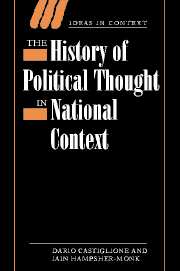Book contents
- Frontmatter
- Contents
- List of contributors
- Preface
- 1 Introduction The history of political thought and the national discourses of politics
- 2 The voice of the ‘Greeks’ in the conversation of mankind
- 3 History of political theory in the Federal Republic of Germany: strange death and slow recovery
- 4 A German version of the ‘linguistic turn’: Reinhart Koselleck and the history of political and social concepts (Begriffsgeschichte)
- 5 One hundred years of the history of political thought in Italy
- 6 Discordant voices: American histories of political thought
- 7 The professoriate of political thought in England since 1914: a tale of three chairs
- 8 The history of political thought and the political history of thought
- 9 The rise of, challenge to and prospects for a Collingwoodian approach to the history of political thought
- 10 Towards a philosophical history of the political
- 11 ‘Le retour des émigrés’? The study of the history of political ideas in contemporary France
- 12 National political cultures and regime changes in Eastern and Central Europe
- 13 The limits of the national paradigm in the study of political thought: the case of Karl Popper and Central European cosmopolitanism
- 14 Postscript. Disciplines, canons and publics: the history of ‘the history of political thought’ in comparative perspective
- Index
- IDEAS IN CONTEXT
11 - ‘Le retour des émigrés’? The study of the history of political ideas in contemporary France
Published online by Cambridge University Press: 23 September 2009
- Frontmatter
- Contents
- List of contributors
- Preface
- 1 Introduction The history of political thought and the national discourses of politics
- 2 The voice of the ‘Greeks’ in the conversation of mankind
- 3 History of political theory in the Federal Republic of Germany: strange death and slow recovery
- 4 A German version of the ‘linguistic turn’: Reinhart Koselleck and the history of political and social concepts (Begriffsgeschichte)
- 5 One hundred years of the history of political thought in Italy
- 6 Discordant voices: American histories of political thought
- 7 The professoriate of political thought in England since 1914: a tale of three chairs
- 8 The history of political thought and the political history of thought
- 9 The rise of, challenge to and prospects for a Collingwoodian approach to the history of political thought
- 10 Towards a philosophical history of the political
- 11 ‘Le retour des émigrés’? The study of the history of political ideas in contemporary France
- 12 National political cultures and regime changes in Eastern and Central Europe
- 13 The limits of the national paradigm in the study of political thought: the case of Karl Popper and Central European cosmopolitanism
- 14 Postscript. Disciplines, canons and publics: the history of ‘the history of political thought’ in comparative perspective
- Index
- IDEAS IN CONTEXT
Summary
Writing in the Revue de synthèse in 1988, Stefan Collini remarked that it was ‘the area of the history of political thought’ in English-speaking countries that marked ‘the point of greatest contrast with intellectual developments in France’. However, he went on, there were ‘signs that a re-alignment of the intellectual field . . . may give political thought greater prominence’. This possibility he attributed to ‘the recession of Marxism’ and to what he described as ‘a disenchantment with some of the major systematic theoretical constructions of recent decades’. Collini's suspicions have proved to be well founded. Since the beginning of the 1990s alone France has seen the creation of three reviews devoted, in different ways, to the study of the history of political thought: Philosophie politique, first published in 1992; La pensèe politique, in 1993; and the Revue française d'histoire des idées politiques, in 1995.
What has undoubtedly been the case, therefore, is that the muchvaunted ‘return to politics’ that had begun to take shape in the 1970s has now been bearing fruit. Indeed, it has had its own manifesto in the shape of René Rémond's edited volume Pour une histoire politique and its own institutional locations: the Fondation Nationale des Sciences Politiques and the Université Paris X Nanterre as opposed to the Ecole des Hautes Études en Sciences Sociales (EHESS) of the Annales school. From 1984 onwards it has had its own review, Vingtième siècle, and its own subject, ‘le temps présent’, now recognised as a legitimate field of inquiry.
- Type
- Chapter
- Information
- The History of Political Thought in National Context , pp. 204 - 227Publisher: Cambridge University PressPrint publication year: 2001



